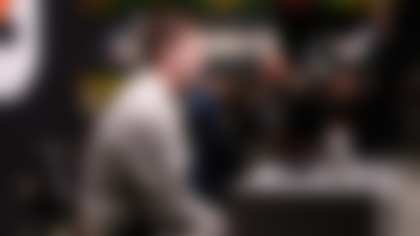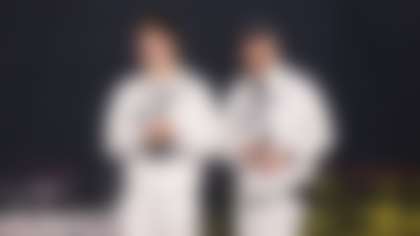PITTSBURGH -- The first 11-10 game in NFL history shouldn't have ended that way, referee Scott Green said after a last-minute touchdown was errantly taken away from the Pittsburgh Steelers on Sunday.
The officiating mistake didn't affect the outcome since the Steelers still would have won, but the touchdown would have changed the score to 17-10 -- or, more likely, 18-10, since the teams were lined up for an extra-point try that was never attempted.
NFL explains ending
On Monday, the NFL released a statement explaining the ruling in the San Diego-Pittsburgh game, which ended in the first 11-10 final in league history. More ...
On first-and-10 from San Diego's 21 with 5 seconds remaining, Chargers quarterback Philip Rivers threw a short pass to LaDainian Tomlinson over the middle for 3 yards. Tomlinson turned and made a handoff-type lateral to wide receiver Chris Chambers, who attempted to pitch the ball to a teammate only to have safety Troy Polamalu scoop it up and score from the 12.
Both teams left the field on what looked to be a game-ending play, but were called back by the officials for the extra-point attempt. At that point, the replay official called for a review.
After watching the play, Green initially announced the ruling on the field was upheld and the touchdown counted. But the officiating crew huddled again before the extra-point attempt and changed the call, deciding that an illegal forward pass should have ended the play.
Green, in a postgame interview with a pool reporter, said that call was errant -- even though his explanation for the confusion was almost as confusing as the play itself.
"We should have let the play go through in the end, yes," Green said. "It was misinterpreted that instead of killing the play, we should have let the play go through."
Green said the confusion occurred because there was a misunderstanding about which lateral was in question.
"The first pass was the one that was illegal, but it only kills the play if it hits the ground," Green said. "That was incorrect to have killed it at that point. The ruling should have let the play go on. That's just the way that it played out. We believe the second pass was legal."
Green was asked why, since the ball didn't hit the ground during any of the tossing, the officials decided after huddling that the play should have ended.
Four downs
[
[
» Philip Rivers didn't pass for a touchdown for the first time in the last 17 games.
» Ben Roethlisberger recorded his sixth career 300-yard game (second most in franchise history).
» For the 18th time in his career, Hines Ward recorded 100 yards receiving.
"We didn't kill it on the field," Green said. "After (the) discussion we decided ... there was some confusion over which pass we were talking about and it was decided that it was the second pass that was illegal that did hit the ground and therefore we killed the play there."
However, the officials realized afterward they erred.
"I know," Green said. "The rule was misinterpreted."
Asked about the officiating -- the Steelers drew 115 yards in penalties to the Chargers' 5 -- Pittsburgh coach Mike Tomlin declined to comment.
"No, I have never seen a game ended with 13-to-1 in penalties, but I am not answering questions about the officiating," Tomlin said.
Copyright 2008 by The Associated Press



